Tires are one of the key components of a vehicle. Keeping them in good condition is essential to ensure your safety while driving. Regular maintenance inspections will assist you in increasing the lifespan of your tires and save you money. However, with so many factors to consider, it can be challenging to determine when it is time to replace your tires.
This guide will examine how often you must change your Dunlop commercial truck tires and other essential tire maintenance tips to keep your car running smoothly.
Tire Wear and Tear
Tires deteriorate over time for assorted reasons, including the car you drive, your driving style, and the road conditions you experience. As a result, it is crucial to frequently examine your tires for wear and tear. For example, if your tread depth is less than 1.6mm, it might be beneficial to change your tires. In addition, it is crucial to immediately change the tires if you spot any lumps, nicks, or cracks.
Driving Conditions
The weather and road conditions you encounter while driving impact tire wear and tear. For example, if you drive on rough or pothole-filled roads, your tires will wear out quicker than if you drive primarily on smooth highways. Likewise, if you live in an area with harsh winters, it is essential to consider using winter tires designed to provide better traction in icy conditions.
Driving Habits
Your driving habits have an enormous impact on how long your tires last. For instance, driving at high speeds and performing forceful braking and acceleration might shorten the lifespan of your tires. On the other hand, keeping your speed at or below the posted limit, avoiding abrupt acceleration and braking, and keeping a safe distance from other cars can all considerably increase the life of your tires.
Tire Pressure
Correct tire pressure is also key to prolonging the lifespan of your tires. Under-inflated tires wear out faster and can significantly impact your car's fuel efficiency. On the other hand, over-inflated tires might result in uneven wear and shorten the life of your tires. Therefore, checking your tire pressure regularly is essential to ensure it is correctly inflated.
Recommended Tire Replacement
Most tires have a recommended lifespan of six years from the date of manufacture, regardless of the amount of usage. Therefore, checking your tires annually after the first five years is essential to ensure they are safe.
What is the Capacity for Tires to last?
Tires are a critical component of any vehicle, and it is vital to understand their capacity to last. However, the life expectancy of tires varies, depending on many factors such as driving habits, road conditions, and weather. On average, a standard tire can last between 25,000 to 50,000 miles, but some high-end tires can last up to 80,000 miles. Nevertheless, it is essential to conduct regular inspections and maintenance to ensure that the tires remain safe for driving.
Additionally, it is crucial to remember that the tires' durability diminishes over time, even if they are not used regularly. Therefore, replacing the tires at least every six years is recommended, regardless of whether they have reached their full mileage capacity. Understanding the capacity for tires to last and taking appropriate steps to maintain them ensures safe and enjoyable driving overall.
Conclusion:
Maintaining the condition of your tires is crucial to ensure that you are driving safely and efficiently. Always drive safely and often inspect them for any wear and tear indications. To increase the life of your tires, do not forget to check the pressure and change them frequently. Moreover, if you are unsure about the condition of your tires, consult with a tire expert who can advise you on the best course of action. The durability of your car and your safety depend on maintaining your tires.


